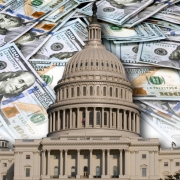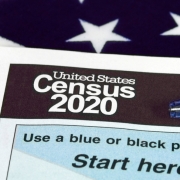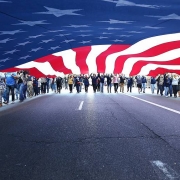No one saw it coming—that the next big thing of the 21st century would be the nation-state, an idea from the 17th. Yet it has suddenly become a global phenomenon—a driving force of politics in the U.S. and around the world and the subject of intense intellectual debate. The news has even come to Harvard, where a professor of history has written a book about American nationhood, and a professor of economics says that “there is something special about the nation-state—it creates reciprocal obligations that don’t exist across national borders.”
There is, to be sure, a resistance. One salvo against the organizers of this week’s National Conservatism Conference in Washington accuses us of injecting “a malignant form of nationalism . . . into the American body politic” and said we “need to be mercilessly defeated on the battlefield of ideas as if September 1, 1939”—the day Germany invaded Poland—“were approaching.”
But in general, the mood has moved through the stages of grief from denial to anger to acceptance—acceptance that the nation-state is alive and well, not about to die and make way for global progressivism. To wit:
• The race card and the Nazi card have been played so promiscuously against nationalism proponents that they have lost most of their power. The accusers keep flailing away, but at this point they are only complicating efforts to isolate and condemn the actual white supremacists and anti-Semites in our midst.
• Some liberals acknowledge—or even insist—that fraternal affections and group loyalties are natural and potentially even worthy. Some even show hints of recognizing that social customs and national traditions are a firmer foundation for political order than the ideology of atomized, free-floating individual autonomy.
• Beyond the world of political activists and intellectuals, these propositions have wide appeal, grounded in everyday experience. Even in the midst of all the scare talk, pollster Scott Rasmussen reports that a substantial majority of Americans—yes, even suburban women—have a favorable view of “nationalism” and “America nationalism.”
So we political conservatives, who have been aroused in our own way by the nationalist awakening, have a great opportunity to recast, enlarge and proselytize our ideas. It’s time to move beyond dueling litanies of the nation-state’s past glories on the one hand and horrors on the other.
Let me draw an analogy from earlier awakenings—the religious Great Awakenings that swept over America in the 18th and 19th centuries. In the American colonies and early U.S., the new religious impulses were much more populist, participatory, and enthusiastic than what had come before, and posited a new relationship between God and his people and among his people. Many feared that the awakenings were dangerous and divisive, that they threatened to rekindle the old intolerant religious hatreds and bloodshed that had brought so many to the New World in the first place.
Yet as it turned out, the secular consequences of the awakenings were unifying and enlarging, galvanizing the American nation. For one thing, they brought many women and black Americans to Christian practice and belief. Beginning in the 1730s, the First Great Awakening—with its emphasis on personal responsibility and self-rule—was an important antecedent to the American Revolution, the Declaration of Independence and the Constitution. The 19th-century Second Great Awakening, with its emphasis on moral obligation and social justice, was a vital impetus to the abolition of slavery.
I am not suggesting a direct lineage from those awakenings to today’s. The 2010s are no more similar to the 1730s and 1830s than to the 1930s. There are, however, two important parallels. First, both religion and nation are neither threats nor panaceas but something more fundamental. They are central arenas of human endeavor—institutional embodiments of human understanding and aspiration, of human excellence and folly. To oppose them is to oppose human nature. To say that the nationalist hatreds of the past oblige us to reject a political order of independent nations is akin to saying that the Crusades and Wars of Religion make atheism the only viable belief system.













